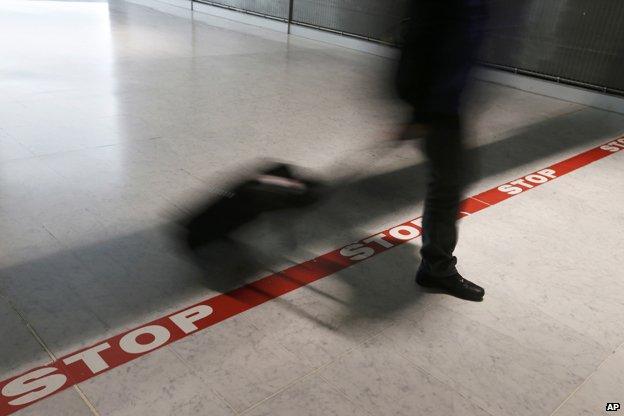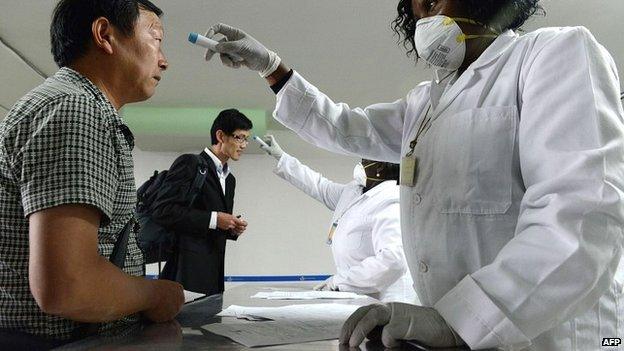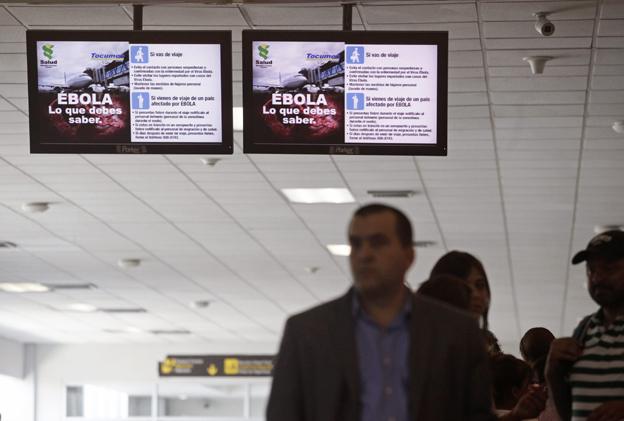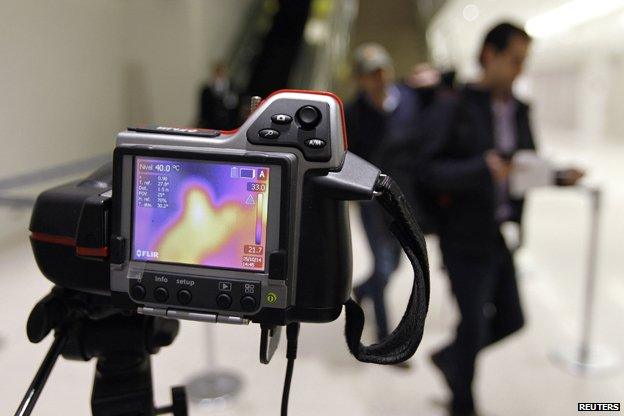Is it worth screening for Ebola at airports?
- Published

Passengers arriving at a growing number of international airports are being screened for Ebola. But how effective are the tests and will they really help to stop the virus spreading?
Screening is now being carried out at airports in a number of countries including the UK, US, Canada, France and the Czech Republic. People travelling from the West African nations affected by Ebola - Liberia, Guinea and Sierra Leone - have their temperatures taken and are asked to fill in a health questionnaire.
But when you consider the statistics, it seems the impact of this increased vigilance is limited. "Traveller screening and bans and so forth are really addressing the symptom, not necessarily the root cause, and ultimately controlling the outbreak in West Africa is going to be the most effective way to protect the interests of the rest of the world," says Dr Kamran Khan of St Michael's Hospital in Toronto.
He specialises in infectious diseases and is one of the authors of a paper, external examining the potential for this outbreak of Ebola to be spread by commercial air travel.
Khan analysed data for worldwide flight schedules between 1 September and 31 December this year, along with historic data from 2013 to project how many people with Ebola might leave Guinea, Liberia and Sierra Leone.
In the first part of the study, he looked at how efficient it is to screen people taking international flights, and found there were three scenarios to consider.

The first is to screen passengers as they leave a country - this is known as exit screening.
For this there are only three points at which you would need to perform the tests - the airports that serve the capital cities of Liberia, Guinea and Sierra Leone. Between September and December 2013, that would have meant screening 144,798 passengers.
The second option is to screen those same passengers on direct flights out of the three affected countries when they land at their destinations, which would be airports at one of 15 cities across 15 different countries - this is called entry screening.
The third option is where things start to get tricky.
"There are very few direct flights out of the three countries and therefore most travellers have to pick up a connecting flight," says Khan
"So in order to ensure a country picked up the passengers that originated from one of the West African countries, they would need to screen all international travellers."
That sees the number of airports where screening would be required go up from 15 to 1,238 and the number of passengers that would need to be screened rises to nearly 363 million.
As a result airports would have to scan 2,512 passengers for every one that has had potential exposure to the Ebola virus.

How does entry screening work?

Temperatures taken to check whether people have a fever
Passengers asked questions such as, "Have you been near anyone with Ebola? Have you cared for anyone with severe illness who died of an unknown cause? Have you been vomiting or do you feel generally unwell? Have you had any contact with dead bodies or been to any funerals?"
Anyone with suspected Ebola is taken to hospital
In the UK passengers deemed to be at high risk but displaying no symptoms will be contacted daily
Travellers told who to call and what to do if they become unwell

All passengers flying from international airports in Guinea, Liberia and Sierra Leone are already screened prior to take off, and anyone who shows symptoms before boarding their plane should be refused permission to fly.
Therefore screening travellers when they land can only identify people who develop symptoms during their flight - so what are the chances of that happening?
The incubation period for Ebola - the time from exposure to the virus to a person showing symptoms - is on average 9 days. The average flight out of one of the affected West African countries is about six hours, so the window for symptoms to develop on board a plane is small.
Dr Craig Spencer - the doctor who tested positive for Ebola in New York on 23 October - was screened at JFK airport on his return from Guinea on 17 October but he wasn't picked up because he wasn't showing symptoms at the time.
For the same reason, airport tests may not have identified the first person diagnosed with Ebola in the US in the current outbreak either - Thomas Eric Duncan had travelled from Liberia to Dallas where he died.
Khan and his team also wanted to establish how many people infected with Ebola in Guinea, Liberia and Sierra Leone were likely to fly.
The table below shows that even in the countries at the centre of the Ebola outbreak, the chances of someone becoming infected is low and very few of those people will actually fly - especially if exit screening is employed.
On average, across these three countries, one person infected with Ebola would travel every 0.14 months (roughly five days) if there were no exit screening place compared to one every 0.35 months (every 11 days) if exit screening is carried out.
Governments have long known how hard it is to identify passengers carrying infectious diseases - they've tried it before.
In 2003 an outbreak of Sars - severe acute respiratory syndrome - began in Guangdong province in China. In the following months cases were reported in Hong Kong, Singapore and Vietnam.
The World Health Organization issued a global health alert for Sars as it became clear that the disease was being spread by global air travel.
In response, Canada introduced screening at airports and passengers were asked a series of questions.
"700,000 people filled in a questionnaire of whom about 2,500 answered 'yes' to one of the questions. Those people were all referred for medical investigation and none of them had SARS," says David Mabey, professor of communicable diseases at the London School of Hygiene and Tropical Medicine, and co-author of a British Medical Journal paper Airport Screening for Ebola.

A thermal camera monitors body temperature of passengers arriving in Tocumen airport, Panama City
"They introduced thermal scanners, which are supposed to detect those with a raised temperature. Almost 500,000 went through those scanners of whom 95 were thought to have a raised temperature... but on investigation none of them had a fever.
"Overall, of more than a million people screened, not one case of Sars was found. The cost of this exercise was 17m Canadian dollars ($15m, £9.4m)," says Mabey.
Of course the dangers of not doing any screening at all at airports can be highlighted by a case in Nigeria.
On 20 July, before exit screening was introduced, a man who was ill flew from Liberia to Lagos. He collapsed at the Nigerian airport and was taken to hospital. Three days later it was confirmed that he had Ebola.
Medical experts identified 898 people who could be connected to him - primary, secondary and tertiary contacts. Had he not collapsed at the airport, and instead gone into the centre of Lagos - a city with a population of more than 20 million people - the number of contacts would have risen rapidly.
So while governments around the world are considering big screening programmes where the chances of detection are low, the research suggests screening those getting on and off direct flights is the smartest approach.
Listen to More or Less on BBC Radio 4 and the World Service, or download the free podcast.
Subscribe to the BBC News Magazine's email newsletter to get articles sent to your inbox.